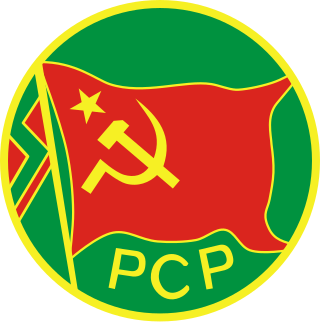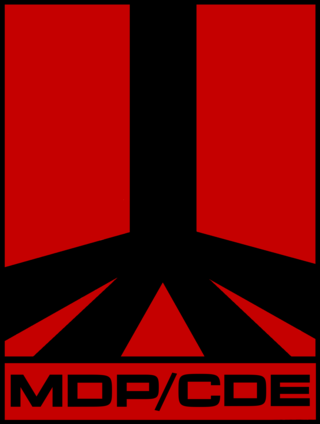In politics, a red–green alliance or red–green coalition is an alliance of "red" parties with "green" parties. The alliance is often based on common left political views, especially a shared distrust of corporate or capitalist institutions. While the "red" social-democratic parties tend to focus on the effects of capitalism on the working class, the "green" environmentalist parties tend to focus on the environmental effects of capitalism.

The Portuguese Communist Party is a communist and Marxist–Leninist political party in Portugal based upon democratic centralism. It is one of the strongest communist parties in Western Europe and the oldest Portuguese political party with uninterrupted existence. It is characterized as being between the left-wing and far-left on the political spectrum. Since 1987, it runs to any national, local and European elections in coalition with the Ecologist Party "The Greens" (PEV), assembled in the Unitary Democratic Coalition (CDU).

The Ecologist Party "The Greens" is a Portuguese eco-socialist political party. It is a member of the European Greens and a founding member of the European Federation of Green Parties.

The Federation of the Greens, frequently referred to as Greens (Verdi), was a green political party in Italy. It was formed in 1990 by the merger of the Federation of Green Lists and the Rainbow Greens.

Elections in Portugal are free, fair, and regularly held, in accordance with election law.

The Unitary Democratic Coalition is an electoral and political coalition between the Portuguese Communist Party and the Ecologist Party "The Greens". The coalition also integrates the political movement Democratic Intervention.

The 1995 Portuguese legislative election took place on 1 October. The election renewed all 230 members of the Assembly of the Republic.

The 1987 Portuguese legislative election took place on 19 July. The election renewed all 250 members of the Assembly of the Republic.

Constituent Assembly elections were carried out in Portugal on 25 April 1975, exactly one year after the Carnation Revolution. The election elected all 250 members of the Portuguese Constituent Assembly.

Since 1974, the year of the Carnation Revolution, seventeen legislative elections were held in Portugal.

The 1979 Portuguese legislative election took place on 2 December. The election renewed all 250 members of the Assembly of the Republic, 13 seats less than those elected in 1976.

Local elections were held in Portugal on 16 December 1979. They were the 2nd local elections in Portugal since the democratic revolution of 1974 introduced the concept of democratic local power. The elections took place just two weeks after the 1979 legislative election.

Local elections were held in Portugal on Sunday, 12 December 1976. They were the first local elections in Portugal. The democratic revolution of 1974 introduced the concept of democratic local power, that should be exerted by the citizens in their towns and cities. These elections ended a cycle of three elections in 1976, after the 1976 legislative election in April and the 1976 Presidential election in June.

Local elections were held in Portugal on 12 December 1982. They were the third local elections in Portugal since the democratic revolution of 1974 introduced the concept of democratic local power.

Local elections were held in Portugal on 15 December 1985. They were the fourth local elections in Portugal since the democratic revolution of 1974 introduced the concept of democratic local power. The elections took place just nine weeks after the 1985 legislative election and just one month before the 1986 Presidential elections.

This is a table of the electoral results of the Portuguese Communist Party. Despite the Party had been founded in 1921, the party experienced little time as a legal party, being forced into clandestinity after a military coup in 1926. In the following decades, Portugal was dominated by the dictatorial regime led by António Oliveira Salazar, that kept the Party illegal. Although the regime allowed elections during some periods, the Party, given its illegal status, could never legally enter the electoral process and the heavy manipulation of the electoral results never allowed a democratic candidate to win. The regime would only end in 1974, with the Carnation Revolution, that implemented broad democratic changes in the country.

The Portuguese Democratic Movement/Democratic Electoral Commission was one of the most important organizations of the democratic opposition to the Estado Novo. It was founded in 1969 as an electoral coalition meant to run in the non-democratic and widely manipulated parliamentary election.
The Greens - Solidarity are a Greek political party that supports the principles of political ecology. It was founded by MEP Nikos Chrysogelos after his retirement from the Ecologist Greens party.
Maria Amélia do Carmo Mota Santos is a Portuguese politician and academic. She served as a Member of the European Parliament from 1989 to 1994 and a member of the Assembly of the Republic from 1985 to 1989 and from 1999 to 2005.











